Mental Health and COVID-19 in Australia: Recovery and Support Services
VerifiedAdded on 2023/01/07
|7
|1676
|29
Report
AI Summary
This report analyzes the impact of the COVID-19 pandemic on mental health, focusing on the experiences of individuals, families, and carers in Australia. It explores the increased stress, anxiety, and potential for relapse among those with pre-existing conditions, as well as the challenges faced by caregivers due to social distancing measures. The report outlines key principles of recovery, emphasizing patient-driven approaches and the importance of social support networks. It also provides detailed descriptions of three online services available in Australia: healthdirect's mental health helplines, Betterhealth, and Mental Health Online, including contact information and service descriptions. The report concludes by highlighting the pandemic's multifaceted impact and the availability of resources to support recovery.
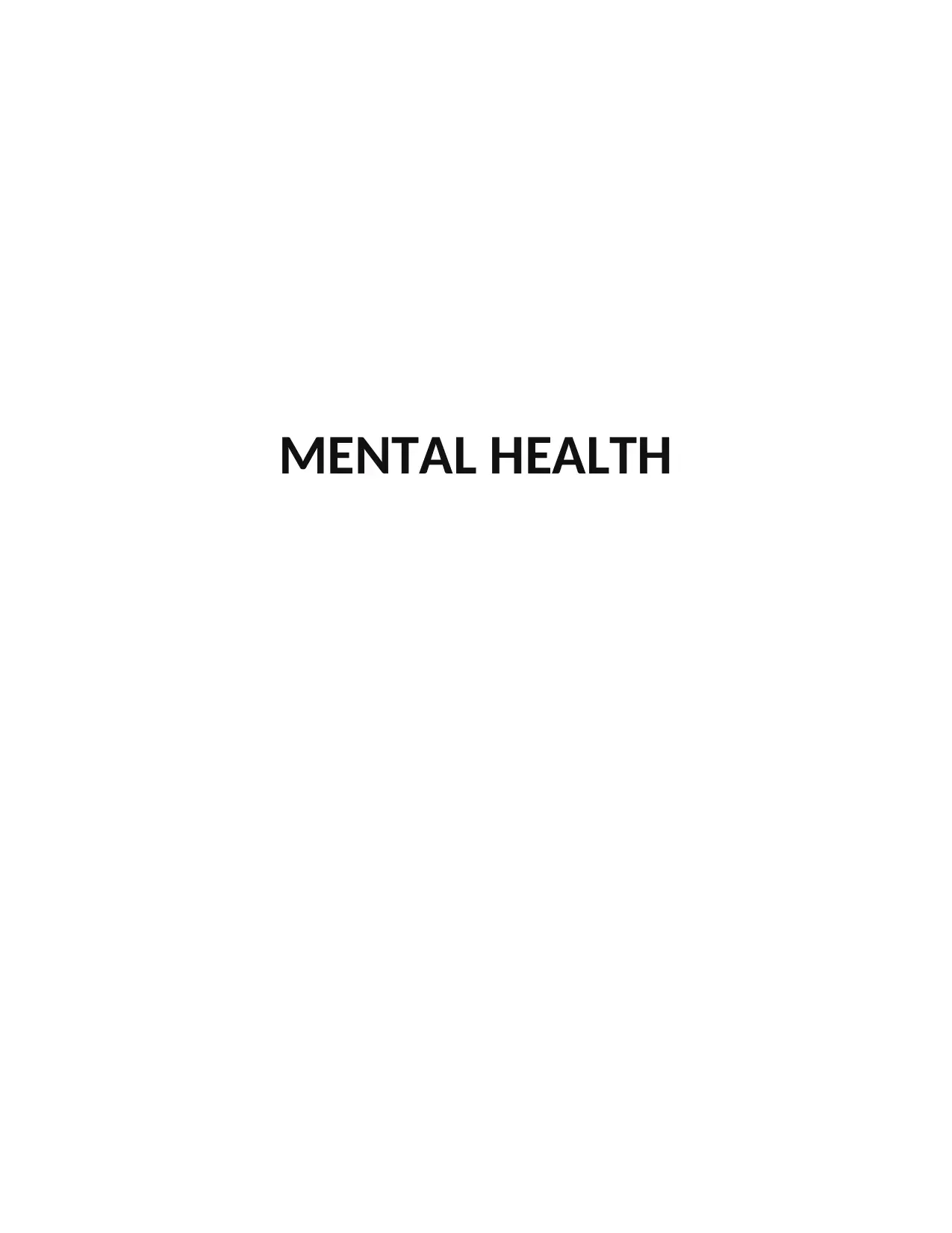
MENTAL HEALTH
Paraphrase This Document
Need a fresh take? Get an instant paraphrase of this document with our AI Paraphraser
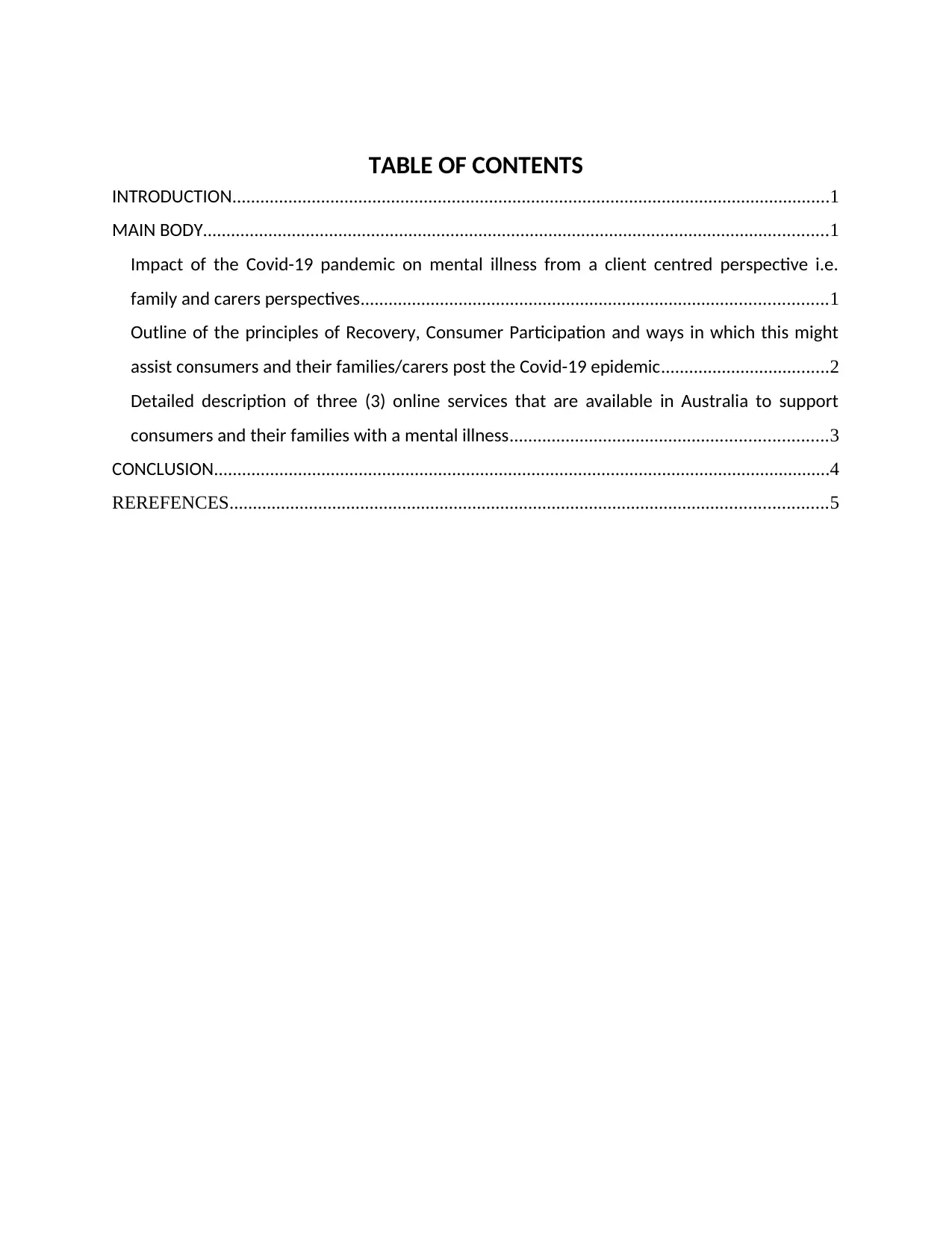
TABLE OF CONTENTS
INTRODUCTION................................................................................................................................1
MAIN BODY......................................................................................................................................1
Impact of the Covid-19 pandemic on mental illness from a client centred perspective i.e.
family and carers perspectives....................................................................................................1
Outline of the principles of Recovery, Consumer Participation and ways in which this might
assist consumers and their families/carers post the Covid-19 epidemic....................................2
Detailed description of three (3) online services that are available in Australia to support
consumers and their families with a mental illness....................................................................3
CONCLUSION....................................................................................................................................4
REREFENCES................................................................................................................................5
INTRODUCTION................................................................................................................................1
MAIN BODY......................................................................................................................................1
Impact of the Covid-19 pandemic on mental illness from a client centred perspective i.e.
family and carers perspectives....................................................................................................1
Outline of the principles of Recovery, Consumer Participation and ways in which this might
assist consumers and their families/carers post the Covid-19 epidemic....................................2
Detailed description of three (3) online services that are available in Australia to support
consumers and their families with a mental illness....................................................................3
CONCLUSION....................................................................................................................................4
REREFENCES................................................................................................................................5
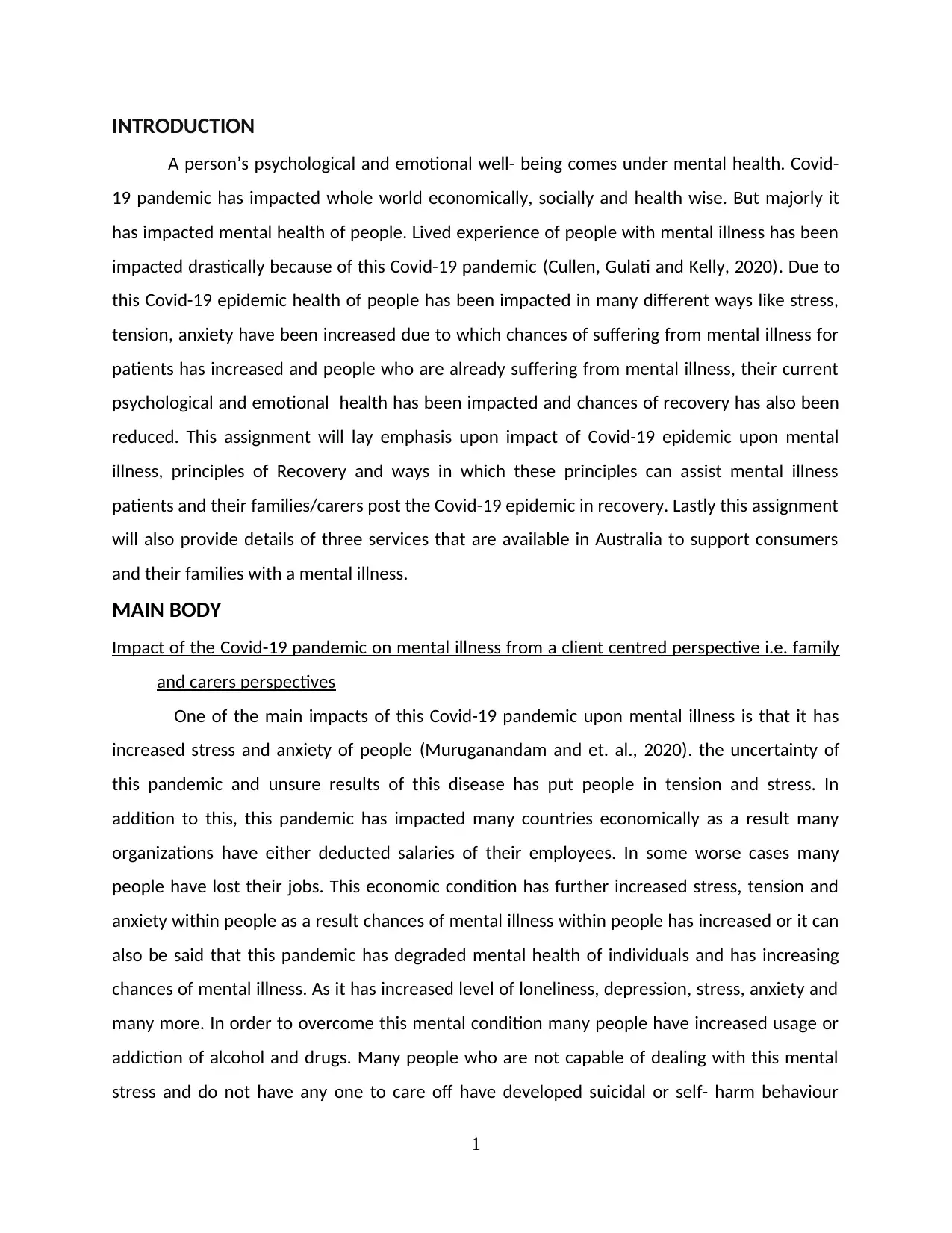
INTRODUCTION
A person’s psychological and emotional well- being comes under mental health. Covid-
19 pandemic has impacted whole world economically, socially and health wise. But majorly it
has impacted mental health of people. Lived experience of people with mental illness has been
impacted drastically because of this Covid-19 pandemic (Cullen, Gulati and Kelly, 2020). Due to
this Covid-19 epidemic health of people has been impacted in many different ways like stress,
tension, anxiety have been increased due to which chances of suffering from mental illness for
patients has increased and people who are already suffering from mental illness, their current
psychological and emotional health has been impacted and chances of recovery has also been
reduced. This assignment will lay emphasis upon impact of Covid-19 epidemic upon mental
illness, principles of Recovery and ways in which these principles can assist mental illness
patients and their families/carers post the Covid-19 epidemic in recovery. Lastly this assignment
will also provide details of three services that are available in Australia to support consumers
and their families with a mental illness.
MAIN BODY
Impact of the Covid-19 pandemic on mental illness from a client centred perspective i.e. family
and carers perspectives
One of the main impacts of this Covid-19 pandemic upon mental illness is that it has
increased stress and anxiety of people (Muruganandam and et. al., 2020). the uncertainty of
this pandemic and unsure results of this disease has put people in tension and stress. In
addition to this, this pandemic has impacted many countries economically as a result many
organizations have either deducted salaries of their employees. In some worse cases many
people have lost their jobs. This economic condition has further increased stress, tension and
anxiety within people as a result chances of mental illness within people has increased or it can
also be said that this pandemic has degraded mental health of individuals and has increasing
chances of mental illness. As it has increased level of loneliness, depression, stress, anxiety and
many more. In order to overcome this mental condition many people have increased usage or
addiction of alcohol and drugs. Many people who are not capable of dealing with this mental
stress and do not have any one to care off have developed suicidal or self- harm behaviour
1
A person’s psychological and emotional well- being comes under mental health. Covid-
19 pandemic has impacted whole world economically, socially and health wise. But majorly it
has impacted mental health of people. Lived experience of people with mental illness has been
impacted drastically because of this Covid-19 pandemic (Cullen, Gulati and Kelly, 2020). Due to
this Covid-19 epidemic health of people has been impacted in many different ways like stress,
tension, anxiety have been increased due to which chances of suffering from mental illness for
patients has increased and people who are already suffering from mental illness, their current
psychological and emotional health has been impacted and chances of recovery has also been
reduced. This assignment will lay emphasis upon impact of Covid-19 epidemic upon mental
illness, principles of Recovery and ways in which these principles can assist mental illness
patients and their families/carers post the Covid-19 epidemic in recovery. Lastly this assignment
will also provide details of three services that are available in Australia to support consumers
and their families with a mental illness.
MAIN BODY
Impact of the Covid-19 pandemic on mental illness from a client centred perspective i.e. family
and carers perspectives
One of the main impacts of this Covid-19 pandemic upon mental illness is that it has
increased stress and anxiety of people (Muruganandam and et. al., 2020). the uncertainty of
this pandemic and unsure results of this disease has put people in tension and stress. In
addition to this, this pandemic has impacted many countries economically as a result many
organizations have either deducted salaries of their employees. In some worse cases many
people have lost their jobs. This economic condition has further increased stress, tension and
anxiety within people as a result chances of mental illness within people has increased or it can
also be said that this pandemic has degraded mental health of individuals and has increasing
chances of mental illness. As it has increased level of loneliness, depression, stress, anxiety and
many more. In order to overcome this mental condition many people have increased usage or
addiction of alcohol and drugs. Many people who are not capable of dealing with this mental
stress and do not have any one to care off have developed suicidal or self- harm behaviour
1
⊘ This is a preview!⊘
Do you want full access?
Subscribe today to unlock all pages.

Trusted by 1+ million students worldwide
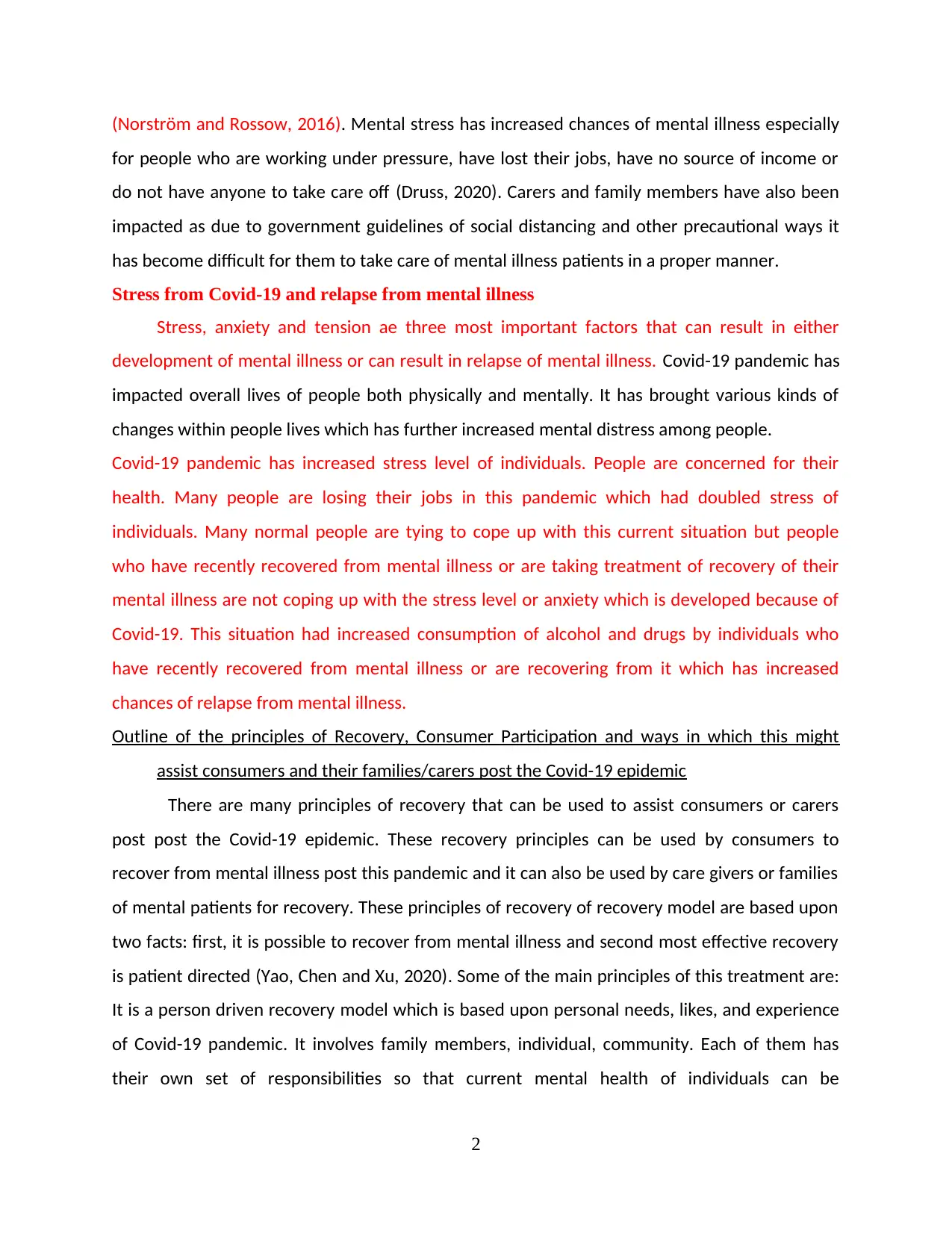
(Norström and Rossow, 2016). Mental stress has increased chances of mental illness especially
for people who are working under pressure, have lost their jobs, have no source of income or
do not have anyone to take care off (Druss, 2020). Carers and family members have also been
impacted as due to government guidelines of social distancing and other precautional ways it
has become difficult for them to take care of mental illness patients in a proper manner.
Stress from Covid-19 and relapse from mental illness
Stress, anxiety and tension ae three most important factors that can result in either
development of mental illness or can result in relapse of mental illness. Covid-19 pandemic has
impacted overall lives of people both physically and mentally. It has brought various kinds of
changes within people lives which has further increased mental distress among people.
Covid-19 pandemic has increased stress level of individuals. People are concerned for their
health. Many people are losing their jobs in this pandemic which had doubled stress of
individuals. Many normal people are tying to cope up with this current situation but people
who have recently recovered from mental illness or are taking treatment of recovery of their
mental illness are not coping up with the stress level or anxiety which is developed because of
Covid-19. This situation had increased consumption of alcohol and drugs by individuals who
have recently recovered from mental illness or are recovering from it which has increased
chances of relapse from mental illness.
Outline of the principles of Recovery, Consumer Participation and ways in which this might
assist consumers and their families/carers post the Covid-19 epidemic
There are many principles of recovery that can be used to assist consumers or carers
post post the Covid-19 epidemic. These recovery principles can be used by consumers to
recover from mental illness post this pandemic and it can also be used by care givers or families
of mental patients for recovery. These principles of recovery of recovery model are based upon
two facts: first, it is possible to recover from mental illness and second most effective recovery
is patient directed (Yao, Chen and Xu, 2020). Some of the main principles of this treatment are:
It is a person driven recovery model which is based upon personal needs, likes, and experience
of Covid-19 pandemic. It involves family members, individual, community. Each of them has
their own set of responsibilities so that current mental health of individuals can be
2
for people who are working under pressure, have lost their jobs, have no source of income or
do not have anyone to take care off (Druss, 2020). Carers and family members have also been
impacted as due to government guidelines of social distancing and other precautional ways it
has become difficult for them to take care of mental illness patients in a proper manner.
Stress from Covid-19 and relapse from mental illness
Stress, anxiety and tension ae three most important factors that can result in either
development of mental illness or can result in relapse of mental illness. Covid-19 pandemic has
impacted overall lives of people both physically and mentally. It has brought various kinds of
changes within people lives which has further increased mental distress among people.
Covid-19 pandemic has increased stress level of individuals. People are concerned for their
health. Many people are losing their jobs in this pandemic which had doubled stress of
individuals. Many normal people are tying to cope up with this current situation but people
who have recently recovered from mental illness or are taking treatment of recovery of their
mental illness are not coping up with the stress level or anxiety which is developed because of
Covid-19. This situation had increased consumption of alcohol and drugs by individuals who
have recently recovered from mental illness or are recovering from it which has increased
chances of relapse from mental illness.
Outline of the principles of Recovery, Consumer Participation and ways in which this might
assist consumers and their families/carers post the Covid-19 epidemic
There are many principles of recovery that can be used to assist consumers or carers
post post the Covid-19 epidemic. These recovery principles can be used by consumers to
recover from mental illness post this pandemic and it can also be used by care givers or families
of mental patients for recovery. These principles of recovery of recovery model are based upon
two facts: first, it is possible to recover from mental illness and second most effective recovery
is patient directed (Yao, Chen and Xu, 2020). Some of the main principles of this treatment are:
It is a person driven recovery model which is based upon personal needs, likes, and experience
of Covid-19 pandemic. It involves family members, individual, community. Each of them has
their own set of responsibilities so that current mental health of individuals can be
2
Paraphrase This Document
Need a fresh take? Get an instant paraphrase of this document with our AI Paraphraser
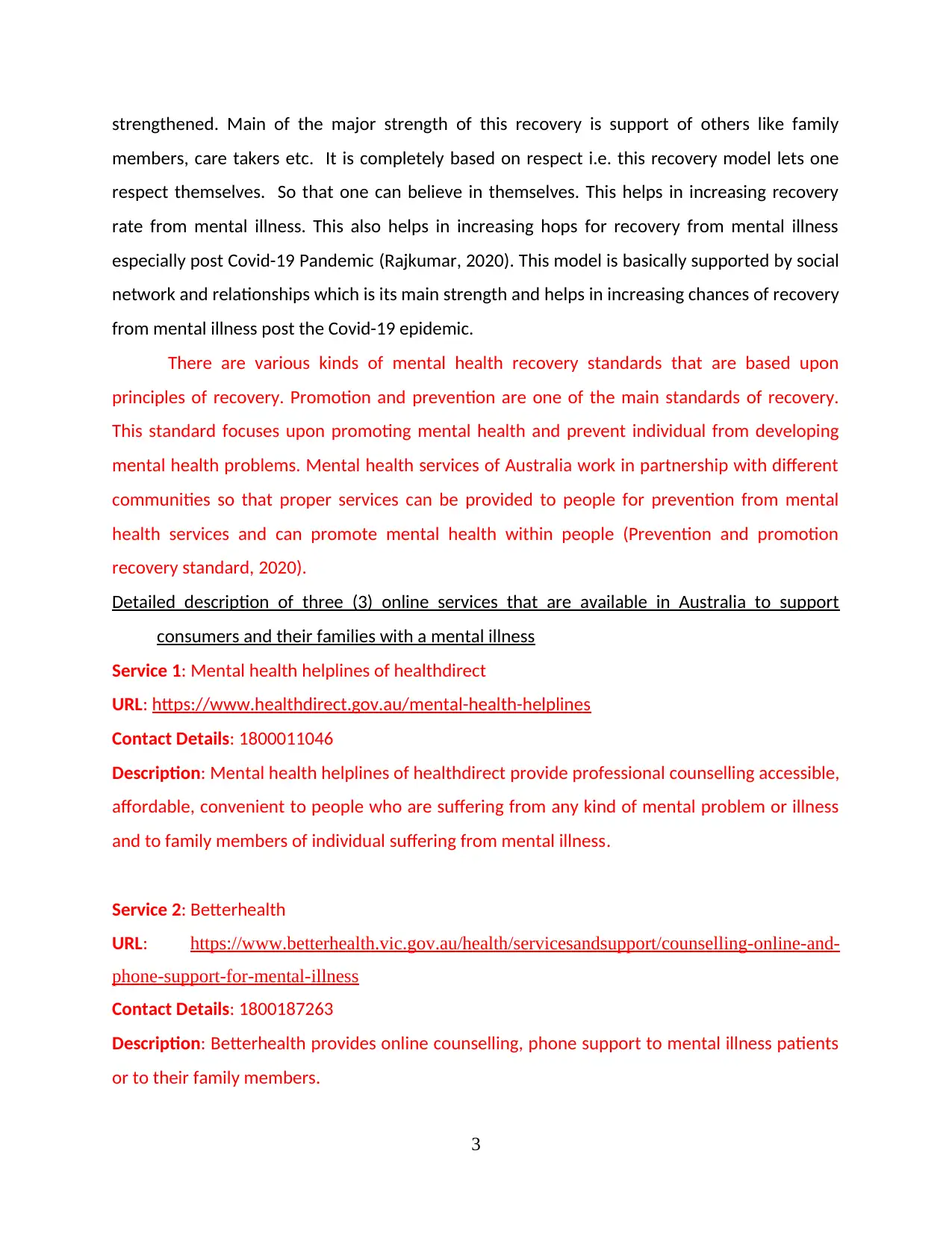
strengthened. Main of the major strength of this recovery is support of others like family
members, care takers etc. It is completely based on respect i.e. this recovery model lets one
respect themselves. So that one can believe in themselves. This helps in increasing recovery
rate from mental illness. This also helps in increasing hops for recovery from mental illness
especially post Covid-19 Pandemic (Rajkumar, 2020). This model is basically supported by social
network and relationships which is its main strength and helps in increasing chances of recovery
from mental illness post the Covid-19 epidemic.
There are various kinds of mental health recovery standards that are based upon
principles of recovery. Promotion and prevention are one of the main standards of recovery.
This standard focuses upon promoting mental health and prevent individual from developing
mental health problems. Mental health services of Australia work in partnership with different
communities so that proper services can be provided to people for prevention from mental
health services and can promote mental health within people (Prevention and promotion
recovery standard, 2020).
Detailed description of three (3) online services that are available in Australia to support
consumers and their families with a mental illness
Service 1: Mental health helplines of healthdirect
URL: https://www.healthdirect.gov.au/mental-health-helplines
Contact Details: 1800011046
Description: Mental health helplines of healthdirect provide professional counselling accessible,
affordable, convenient to people who are suffering from any kind of mental problem or illness
and to family members of individual suffering from mental illness.
Service 2: Betterhealth
URL: https://www.betterhealth.vic.gov.au/health/servicesandsupport/counselling-online-and-
phone-support-for-mental-illness
Contact Details: 1800187263
Description: Betterhealth provides online counselling, phone support to mental illness patients
or to their family members.
3
members, care takers etc. It is completely based on respect i.e. this recovery model lets one
respect themselves. So that one can believe in themselves. This helps in increasing recovery
rate from mental illness. This also helps in increasing hops for recovery from mental illness
especially post Covid-19 Pandemic (Rajkumar, 2020). This model is basically supported by social
network and relationships which is its main strength and helps in increasing chances of recovery
from mental illness post the Covid-19 epidemic.
There are various kinds of mental health recovery standards that are based upon
principles of recovery. Promotion and prevention are one of the main standards of recovery.
This standard focuses upon promoting mental health and prevent individual from developing
mental health problems. Mental health services of Australia work in partnership with different
communities so that proper services can be provided to people for prevention from mental
health services and can promote mental health within people (Prevention and promotion
recovery standard, 2020).
Detailed description of three (3) online services that are available in Australia to support
consumers and their families with a mental illness
Service 1: Mental health helplines of healthdirect
URL: https://www.healthdirect.gov.au/mental-health-helplines
Contact Details: 1800011046
Description: Mental health helplines of healthdirect provide professional counselling accessible,
affordable, convenient to people who are suffering from any kind of mental problem or illness
and to family members of individual suffering from mental illness.
Service 2: Betterhealth
URL: https://www.betterhealth.vic.gov.au/health/servicesandsupport/counselling-online-and-
phone-support-for-mental-illness
Contact Details: 1800187263
Description: Betterhealth provides online counselling, phone support to mental illness patients
or to their family members.
3
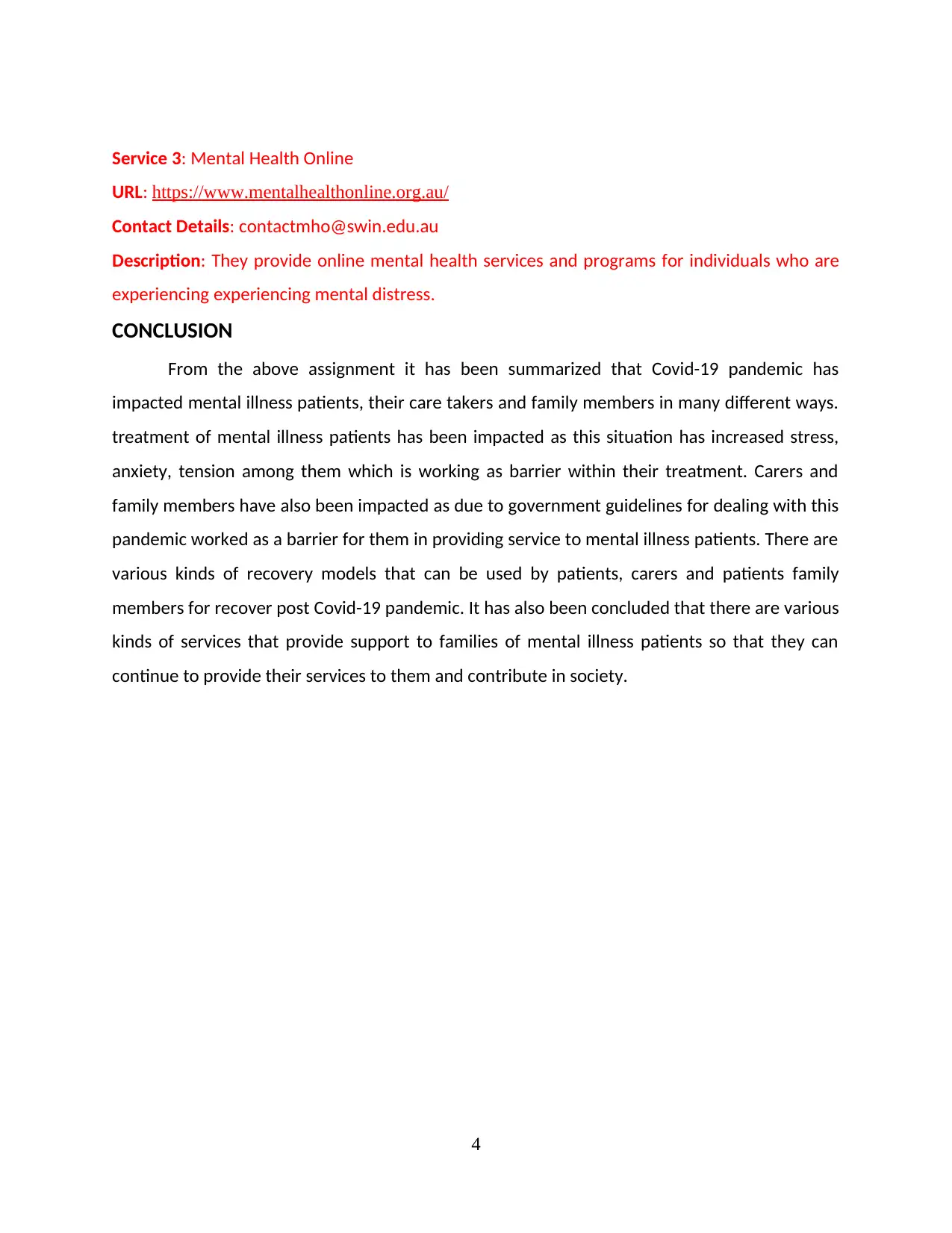
Service 3: Mental Health Online
URL: https://www.mentalhealthonline.org.au/
Contact Details: contactmho@swin.edu.au
Description: They provide online mental health services and programs for individuals who are
experiencing experiencing mental distress.
CONCLUSION
From the above assignment it has been summarized that Covid-19 pandemic has
impacted mental illness patients, their care takers and family members in many different ways.
treatment of mental illness patients has been impacted as this situation has increased stress,
anxiety, tension among them which is working as barrier within their treatment. Carers and
family members have also been impacted as due to government guidelines for dealing with this
pandemic worked as a barrier for them in providing service to mental illness patients. There are
various kinds of recovery models that can be used by patients, carers and patients family
members for recover post Covid-19 pandemic. It has also been concluded that there are various
kinds of services that provide support to families of mental illness patients so that they can
continue to provide their services to them and contribute in society.
4
URL: https://www.mentalhealthonline.org.au/
Contact Details: contactmho@swin.edu.au
Description: They provide online mental health services and programs for individuals who are
experiencing experiencing mental distress.
CONCLUSION
From the above assignment it has been summarized that Covid-19 pandemic has
impacted mental illness patients, their care takers and family members in many different ways.
treatment of mental illness patients has been impacted as this situation has increased stress,
anxiety, tension among them which is working as barrier within their treatment. Carers and
family members have also been impacted as due to government guidelines for dealing with this
pandemic worked as a barrier for them in providing service to mental illness patients. There are
various kinds of recovery models that can be used by patients, carers and patients family
members for recover post Covid-19 pandemic. It has also been concluded that there are various
kinds of services that provide support to families of mental illness patients so that they can
continue to provide their services to them and contribute in society.
4
⊘ This is a preview!⊘
Do you want full access?
Subscribe today to unlock all pages.

Trusted by 1+ million students worldwide
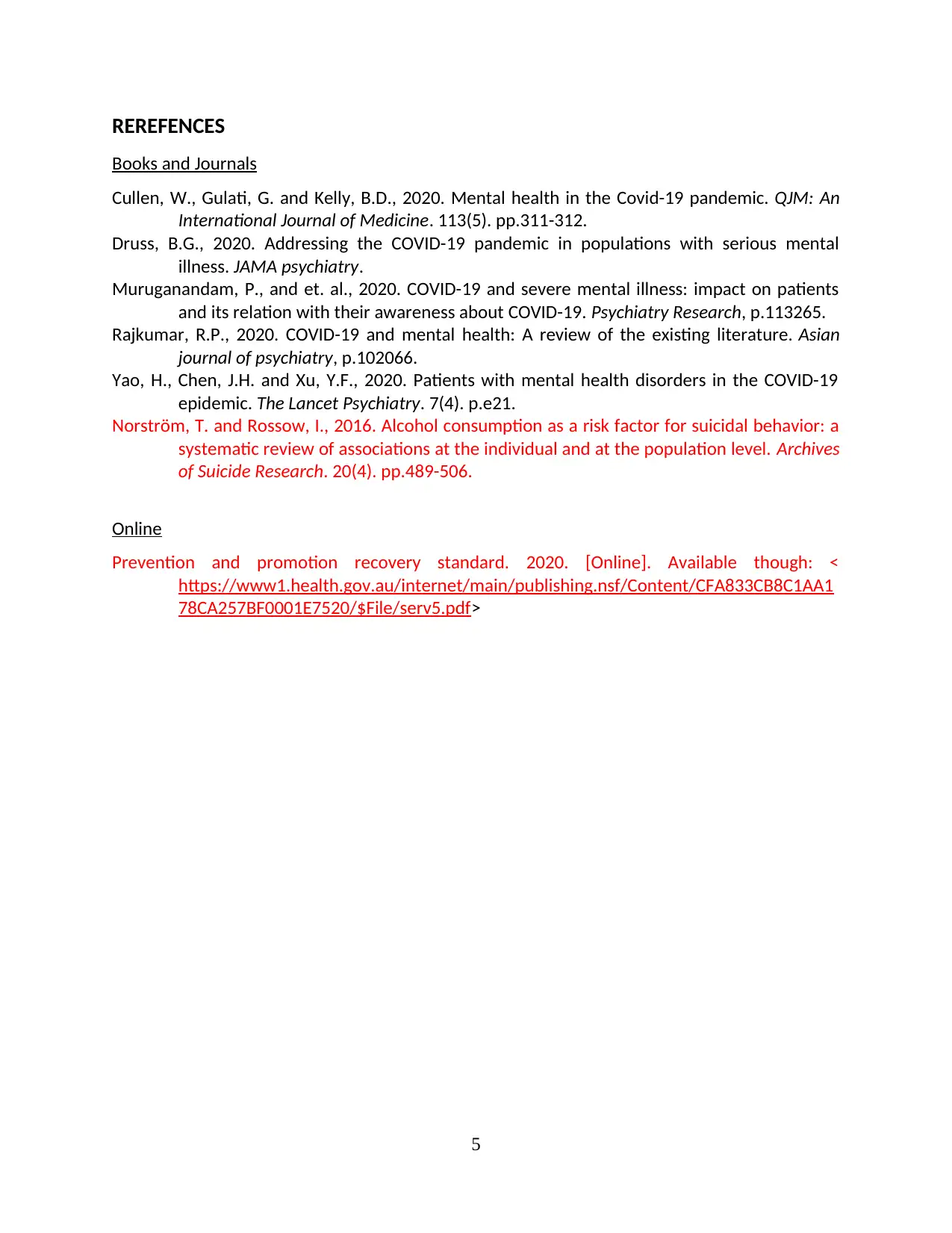
REREFENCES
Books and Journals
Cullen, W., Gulati, G. and Kelly, B.D., 2020. Mental health in the Covid-19 pandemic. QJM: An
International Journal of Medicine. 113(5). pp.311-312.
Druss, B.G., 2020. Addressing the COVID-19 pandemic in populations with serious mental
illness. JAMA psychiatry.
Muruganandam, P., and et. al., 2020. COVID-19 and severe mental illness: impact on patients
and its relation with their awareness about COVID-19. Psychiatry Research, p.113265.
Rajkumar, R.P., 2020. COVID-19 and mental health: A review of the existing literature. Asian
journal of psychiatry, p.102066.
Yao, H., Chen, J.H. and Xu, Y.F., 2020. Patients with mental health disorders in the COVID-19
epidemic. The Lancet Psychiatry. 7(4). p.e21.
Norström, T. and Rossow, I., 2016. Alcohol consumption as a risk factor for suicidal behavior: a
systematic review of associations at the individual and at the population level. Archives
of Suicide Research. 20(4). pp.489-506.
Online
Prevention and promotion recovery standard. 2020. [Online]. Available though: <
https://www1.health.gov.au/internet/main/publishing.nsf/Content/CFA833CB8C1AA1
78CA257BF0001E7520/$File/serv5.pdf>
5
Books and Journals
Cullen, W., Gulati, G. and Kelly, B.D., 2020. Mental health in the Covid-19 pandemic. QJM: An
International Journal of Medicine. 113(5). pp.311-312.
Druss, B.G., 2020. Addressing the COVID-19 pandemic in populations with serious mental
illness. JAMA psychiatry.
Muruganandam, P., and et. al., 2020. COVID-19 and severe mental illness: impact on patients
and its relation with their awareness about COVID-19. Psychiatry Research, p.113265.
Rajkumar, R.P., 2020. COVID-19 and mental health: A review of the existing literature. Asian
journal of psychiatry, p.102066.
Yao, H., Chen, J.H. and Xu, Y.F., 2020. Patients with mental health disorders in the COVID-19
epidemic. The Lancet Psychiatry. 7(4). p.e21.
Norström, T. and Rossow, I., 2016. Alcohol consumption as a risk factor for suicidal behavior: a
systematic review of associations at the individual and at the population level. Archives
of Suicide Research. 20(4). pp.489-506.
Online
Prevention and promotion recovery standard. 2020. [Online]. Available though: <
https://www1.health.gov.au/internet/main/publishing.nsf/Content/CFA833CB8C1AA1
78CA257BF0001E7520/$File/serv5.pdf>
5
1 out of 7
Related Documents
Your All-in-One AI-Powered Toolkit for Academic Success.
+13062052269
info@desklib.com
Available 24*7 on WhatsApp / Email
![[object Object]](/_next/static/media/star-bottom.7253800d.svg)
Unlock your academic potential
Copyright © 2020–2026 A2Z Services. All Rights Reserved. Developed and managed by ZUCOL.





